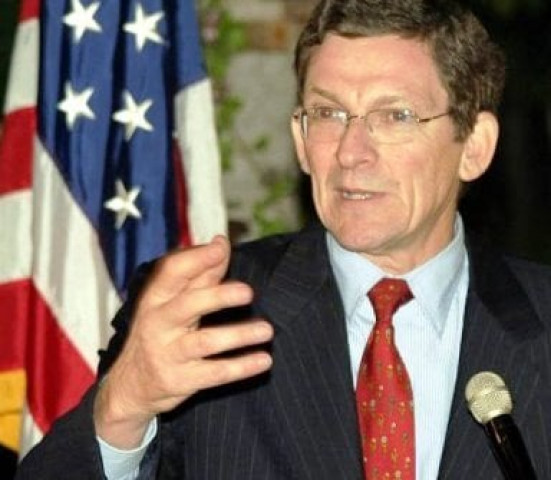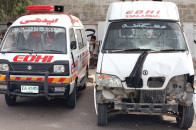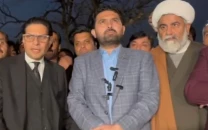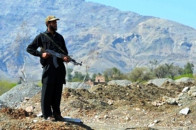Af-Pak envoy cautious, avoids thorny questions
Special envoy maintains Raymond Davis has diplomatic immunity.

Refusing to confirm or deny whether it is official American policy to contract out the war on terror to non-state actors like Raymond Davis, US special envoy for Afghanistan and Pakistan Marc Grossman said such issues could be sorted out between Pakistan and the US through dialogue once the man in question was released.
The ambassador, who is on a two-day visit to Pakistan, said at a media roundtable here on Monday that he did not know the answer to the question, and then admitted that neither he nor Ambassador Cameron Munter, who accompanied him at the event, were authorised to talk about the ‘contractor’ issue.
He tried, without much success, to dispel the impression that all future relations between Pakistan and the US depended on the release of Davis, while reiterating on a number of occasions that the CIA contractor enjoyed diplomatic immunity and therefore under the Vienna Conventions could not be prosecuted in Pakistan.
Grossman did not agree with a questioner that the cancellation of a trilateral meeting following the Davis episode indicated that the Pakistan-US relations were transactional rather than strategic. The Kerry-Lugar-Berman assistance programme underscored emphatically the strategic nature of the US-Pakistan partnership.
He said that the US wanted to see Pakistan grow as a democratic, stable and prosperous country.
He said Pakistan had a vital role in the peaceful resolution of the Afghanistan imbroglio. Islamabad has legitimate concerns about the situation in Afghanistan and “we acknowledge these concerns,” he said. Asked if his recent visit to Jeddah was in any way connected with efforts to enlist Saudi help for the release of Davis, Grossman evaded a direct answer, maintaining that he did mention the case in his presentation in the International Contact Group meeting hosted in Jeddah by the Organisation of Islamic Conference.
Grossman, whose first diplomatic posting was in Pakistan (1977-79), said he had already met President Hamid Karzai twice in one week, once in London and then in Kabul. In Islamabad he met President Asif Zardari, Prime Minister Yousaf Raza Gilani, Finance Minister Hafeez Shaikh, State Minister for Foreign Affairs Hina Rabbani Khar, Foreign Secretary Salman Bashir, Punjab Chief Minister Shahbaz Sharif and Leader of the Opposition Chaudhry Nisar Ali Khan.
In all these meetings, he said, he had reiterated the US commitment to building a broad-based relationship with Pakistan, helping the country overcome the violence that has gripped it and encouraging economic reforms.
He said that he had raised the Davis case in all his interactions with the Pakistani leadership and reiterated the US position on the issue.
Quoting from Secretary of State Hillary Clinton’s speech at the Asia Society early last month, the ambassador said that for peace talks with the Taliban to succeed, Pakistan would have to be part of the process, but in order for this process to succeed, the safe havens inside Pakistan’s borders used as sanctuaries by the Afghan Taliban would have to be closed down.
Quoting further from Clinton’s speech, Grossman said the US was following a strategy with three mutually reinforcing tracks: a military offensive against al Qaeda terrorists and Taliban insurgents; a civilian campaign to bolster the governments, economies and civil societies of Afghanistan and Pakistan to undercut the pull of the insurgency; and an intensified diplomatic push to bring the Afghan conflict to an end and chart a new and more secure future for the region.
The first two tracks provided for the success of the third, which aimed to support an Afghan-led political process to split the weakened Taliban off from al Qaeda and reconcile those who renounced violence and accepted the Afghan constitution with an increasingly stable Afghan government.
Ultimately, Afghans must take responsibility for their own future — for providing security, for strengthening governance, and for reaching a political solution to the conflict, he added.
Told that in the face of such offers the Taliban continued to maintain that they would renounce violence only after the withdrawal of foreign troops from Afghanistan, the ambassador said that there was a choice to be made; those who wanted to return to a life of peace from a life of violence now had the opportunity to make the right choice.
Published in The Express Tribune, March 8th, 2011.



















COMMENTS
Comments are moderated and generally will be posted if they are on-topic and not abusive.
For more information, please see our Comments FAQ